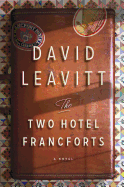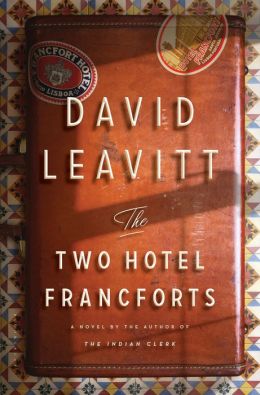 David Leavitt's The Two Hotel Francforts takes place in the summer of 1940, as Americans desperately crowd into Lisbon hotels waiting for the SS Manhattan to rescue them from war-torn Europe. Julia Winters, forced to abandon her dream flat in Paris, loathes the prospect of returning to the U.S. Furiously playing endless games of solitaire, she's delicate, unhappy and in denial about being Jewish. Gullible, well-intentioned Pete Winters, her devoted husband, head of the Buick sales division in France, who has never spent a single night away from his wife, is sincerely trying to tell the story of what happened.
David Leavitt's The Two Hotel Francforts takes place in the summer of 1940, as Americans desperately crowd into Lisbon hotels waiting for the SS Manhattan to rescue them from war-torn Europe. Julia Winters, forced to abandon her dream flat in Paris, loathes the prospect of returning to the U.S. Furiously playing endless games of solitaire, she's delicate, unhappy and in denial about being Jewish. Gullible, well-intentioned Pete Winters, her devoted husband, head of the Buick sales division in France, who has never spent a single night away from his wife, is sincerely trying to tell the story of what happened.
When pigeons swoop low over their café table, Pete ducks, accidentally knocking Julia's playing cards off the table. When he bends to get them, his glasses fall off, and a passing waiter kicks them into the path of charming, attractive Edward Freleng. Wealthy, green-eyed Edward, who has never had to work in his life, is completely dominated by his tall, red-haired wife, Iris, who drives and sails and rides, and intends to hang onto her husband at all costs.
The couples discover they are staying in different hotels with, in essence, the same name, the Hotel Francfort and the Francfort Hotel. On the spur of the moment, the women retire and the men decide to take a spin in Pete's car. Suddenly, Pete and Edward are on a madcap nighttime journey, where they both try absinthe and plunge naked into the sea, changing all of their lives forever.
Leavitt is superb at comedy of manners, his dialogue is witty and tight and his characters constantly reveal themselves while trying to keep their true feelings hidden. But the mischievous, giddy social comedy of the novel's romantic first section becomes progressively more realistic, as vacation romances do.
This tale told by a car salesman of the week that changed his life is scrupulously honest, and Leavitt has never been in greater command of his talents: the genius of the set-ups, the pay-offs that generate more pay-offs, the luminous and perceptive language, the sensuous evocation of Lisbon, the re-creation of the sheer uncertainty in the face of Hitler's relentless advance. In his best work yet, Leavitt is a smart, literate American novelist in the British tradition of Iris Murdoch and E. M. Forster. The Two Hotel Francforts is a story where every sentence counts, human beings are only allowed partial truths and morality matters. --Nick DiMartino
Shelf Talker: A gripping dark comedy of manners set in 1940s Lisbon, in which two couples become entangled in each other's secrets while awaiting evacuation back to the U.S.
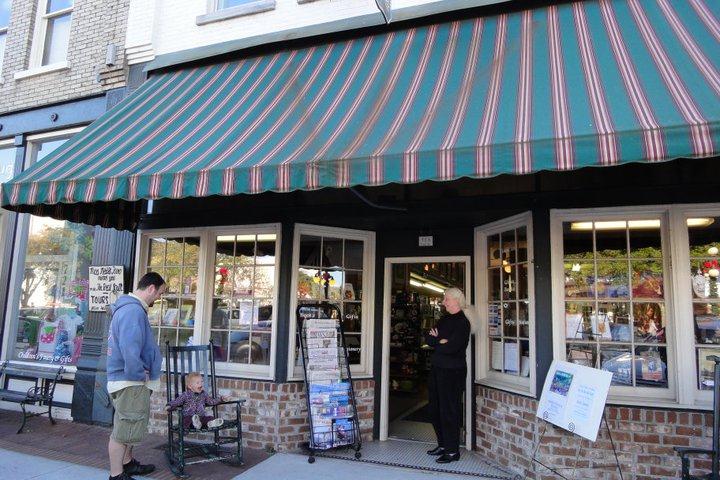 Sad news from Georgetown, S.C.: as reported by the State, a fire early yesterday morning in the historic district destroyed eight buildings, including one housing Harborwalk Books, which was called "a total loss."
Sad news from Georgetown, S.C.: as reported by the State, a fire early yesterday morning in the historic district destroyed eight buildings, including one housing Harborwalk Books, which was called "a total loss."









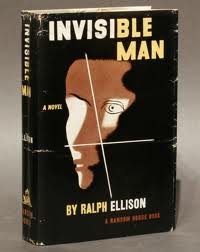 Last night in Asheboro, N.C., the Randolph County Board of Education
Last night in Asheboro, N.C., the Randolph County Board of Education 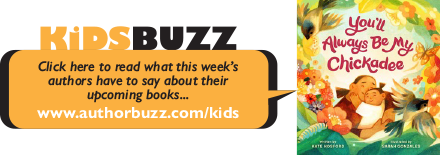
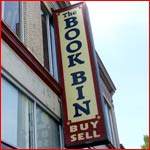 It's been more than two years since Borders closed, but new stores are still popping up in the company's old sites. The latest is the
It's been more than two years since Borders closed, but new stores are still popping up in the company's old sites. The latest is the 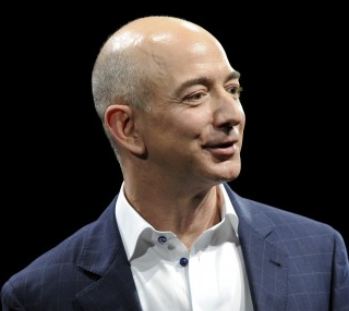 Perhaps because he owns a newspaper now, Amazon founder and CEO Jeff Bezos recently gave several interviews to the press, including
Perhaps because he owns a newspaper now, Amazon founder and CEO Jeff Bezos recently gave several interviews to the press, including 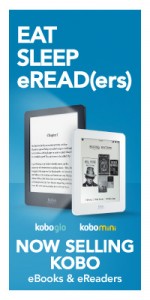 With the American Booksellers Association-Kobo partnership in effect for nearly 10 months, booksellers are happy with many aspects of the program, although there are some areas where work needs to be done, Shelf Awareness found after interviewing more than 50 booksellers from across the U.S.
With the American Booksellers Association-Kobo partnership in effect for nearly 10 months, booksellers are happy with many aspects of the program, although there are some areas where work needs to be done, Shelf Awareness found after interviewing more than 50 booksellers from across the U.S.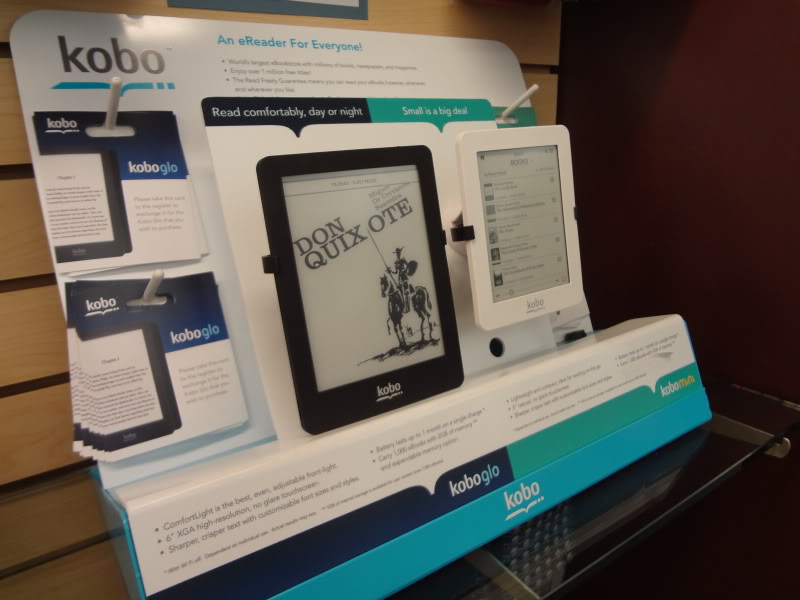
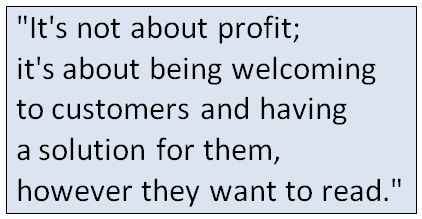 Beyond the ability to stay relevant and retain customers, booksellers also like that this partnership is technically easier than the Google partnership, with fewer steps involved in purchasing e-books and linking accounts. Booksellers also reported that compared to Google, Kobo is a much more engaged partner and more willing to listen to feedback. They appreciate Kobo's NPR publicity campaign, and several booksellers mentioned that having physical hardware to show in-store has made a huge difference compared to the days of the Google partnership. The ability to order Kobo devices through Ingram is much appreciated, as are the in-store displays and basic marketing material provided by Kobo. The device-agnostic nature of the Kobo app is also a plus.
Beyond the ability to stay relevant and retain customers, booksellers also like that this partnership is technically easier than the Google partnership, with fewer steps involved in purchasing e-books and linking accounts. Booksellers also reported that compared to Google, Kobo is a much more engaged partner and more willing to listen to feedback. They appreciate Kobo's NPR publicity campaign, and several booksellers mentioned that having physical hardware to show in-store has made a huge difference compared to the days of the Google partnership. The ability to order Kobo devices through Ingram is much appreciated, as are the in-store displays and basic marketing material provided by Kobo. The device-agnostic nature of the Kobo app is also a plus.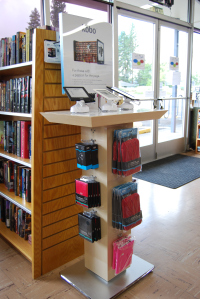 The lack of co-branding in promotions and on devices was the next most common complaint. Some booksellers mentioned instances when sales prices on e-books did not register properly (customers who select a book listed at a discount find that at "check out" the book is the regular price). One bookseller reported that this has happened multiple times, with multiple new releases, and that he was not able to resolve the issue with Kobo.
The lack of co-branding in promotions and on devices was the next most common complaint. Some booksellers mentioned instances when sales prices on e-books did not register properly (customers who select a book listed at a discount find that at "check out" the book is the regular price). One bookseller reported that this has happened multiple times, with multiple new releases, and that he was not able to resolve the issue with Kobo.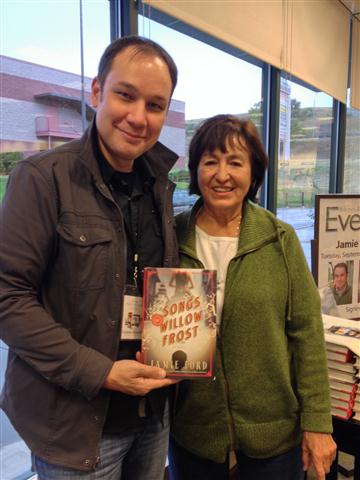 Jamie Ford
Jamie Ford Through December 31, the American Booksellers Association and the American Library Association are hosting the online registration for stores and libraries, respectively, to become World Book Night U.S. host locations for April 23, 2014. The ABA signup page is
Through December 31, the American Booksellers Association and the American Library Association are hosting the online registration for stores and libraries, respectively, to become World Book Night U.S. host locations for April 23, 2014. The ABA signup page is 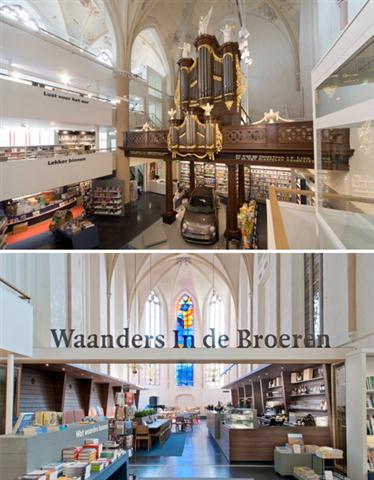 A 15th-century Dominican church in Zwolle, Overijssel, the Netherlands, has been converted into the awe-inspiring bookshop
A 15th-century Dominican church in Zwolle, Overijssel, the Netherlands, has been converted into the awe-inspiring bookshop 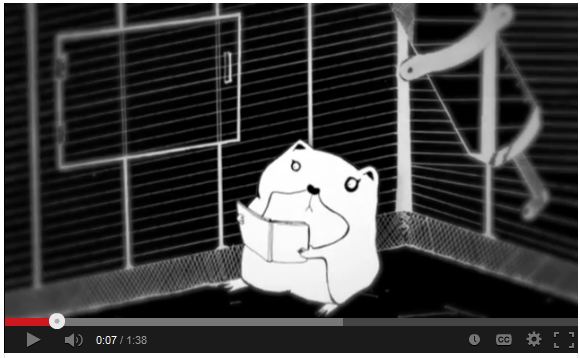 The Diary of Edward the Hamster 1990-1990
The Diary of Edward the Hamster 1990-1990 David Leavitt's The Two Hotel Francforts takes place in the summer of 1940, as Americans desperately crowd into Lisbon hotels waiting for the SS Manhattan to rescue them from war-torn Europe. Julia Winters, forced to abandon her dream flat in Paris, loathes the prospect of returning to the U.S. Furiously playing endless games of solitaire, she's delicate, unhappy and in denial about being Jewish. Gullible, well-intentioned Pete Winters, her devoted husband, head of the Buick sales division in France, who has never spent a single night away from his wife, is sincerely trying to tell the story of what happened.
David Leavitt's The Two Hotel Francforts takes place in the summer of 1940, as Americans desperately crowd into Lisbon hotels waiting for the SS Manhattan to rescue them from war-torn Europe. Julia Winters, forced to abandon her dream flat in Paris, loathes the prospect of returning to the U.S. Furiously playing endless games of solitaire, she's delicate, unhappy and in denial about being Jewish. Gullible, well-intentioned Pete Winters, her devoted husband, head of the Buick sales division in France, who has never spent a single night away from his wife, is sincerely trying to tell the story of what happened.